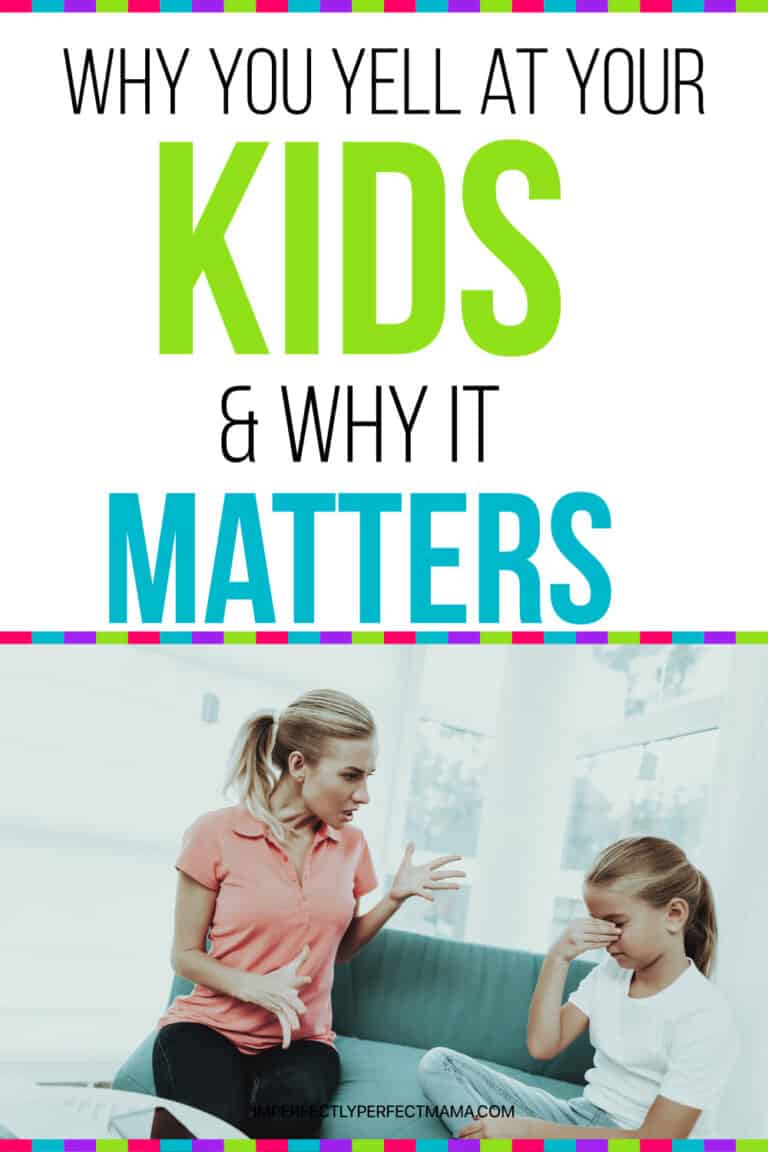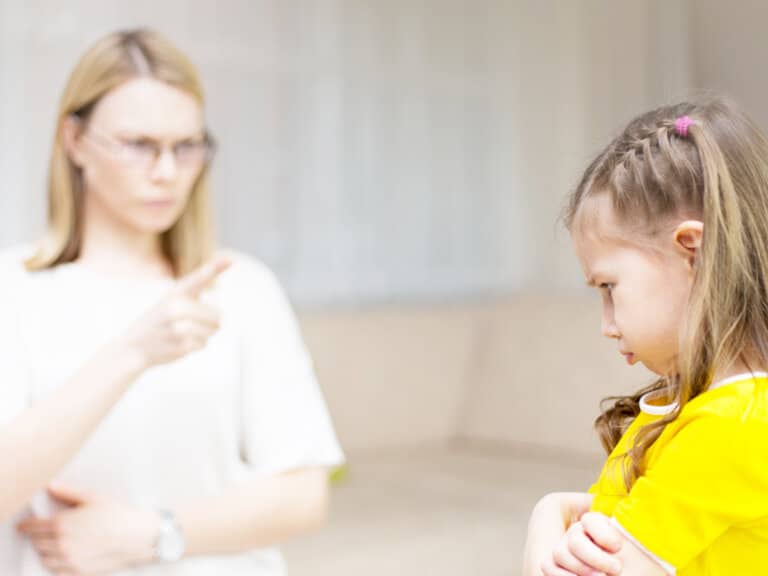We’ve all been there.

Yelling at our kids is an unavoidable part of parenting.
You’re frustrated, you’ve asked nicely, you’ve tried everything you can, and it’s just not working.
The next thing you know you’re yelling at your kids for some reason or another: pick up your room, quiet while I’m on the phone, stop hitting your sister, and on, and on.
Many of us moms feel guilty about all the yelling, promising ourselves that we won’t raise our voices again, but finding we do it again anyway.
If you’re anything like me, yelling at your kids isn’t something you want to do as a mom and you’re looking for ways to avoid it.
This article is going to dive deep into the hard questions we have about yelling at our kids:
- Am I the only one yelling at my kids?
- What is yelling, exactly?
- How does yelling at our kids impact them?
- Will my kids remember my yelling?
- Is yelling at our kids effective discipline?
- How do we stop yelling at our kids?
You Are Not Alone in Yelling at Your Kids
One thing we do know is that yelling is common. 90% of parents report yelling at their kids in the past year, according to the Journal of Marriage and Family.
This statistic goes up to almost 100% of parents for kids ages 7 and older.
We as parents yell either out of frustration, because we think it’s good discipline, or when you’re just desperate.
But what does yelling actually do to kids?
How You Yell at Your Kid Matters
We all have a different measure of what it means to “yell” at our kids.
Is it just a raised voice? Is it shouting or screaming?
What about name-calling?
This is an important place to start, because the type of yelling you engage in with your kids does matter. Some types of yelling are better than others.
Experts agree that the key to keeping yelling from damaging your kids is to make it clear you’re upset with their behavior and not upset with them.
Kids should understand why you’re angry and yelling.
They should be able to link the behavior to the yelling.
For example, your child should think “Mom is mad because I won’t pick up my room” and not “Mom is bad because I’m a bad kid who is too lazy to pick up my room.”.
The key distinction here is shame.
Avoid making comments that your child is being bad and instead focus on the exact behavior they’re doing that is getting them in trouble.
Try to avoid getting angry for no reason or bottling up anger until it explodes.
In these situations, kids may have no explanation for the yelling and, when that happens, they assume it’s because of themselves.
Younger kids are egocentric, meaning they believe they cause everything that happens around them.
Younger kids literally think the world revolves around them because they haven’t developed a sense of “other.” These young kids will feel shame if your yelling isn’t very clearly linked to their behavior.
Yelling Does Impact Our Kids

Most of us were yelled at kids at one point or another and we turned out okay, right? Well, not so fast.
Just because it’s common doesn’t mean it doesn’t impact your kids.
Research is very clear that swearing, cursing, humiliation, and name-calling are different from shouting.
These tactics are considered severe verbal discipline and are closely linked to higher rates of depression, anxiety, and behavioral problems.
This is especially true for older kids and adolescents.
Most of us, though, aren’t shaming our kids. We are raising our voices and shouting for compliance.
Unlike chronic yelling that increases stress, verbal abuse, name-calling, cursing, and other more extreme types of yelling, everyday shouting isn’t deeply researched.
There are, however, some pretty clear practical impacts:
1. Being Out of Control Scares Kids
When you yell at your kids, depending on how often you do it, you may seem out of control to them.
This is especially true if you have more sensitive kids. Some children will tolerate more yelling than others.
Proper attachment in the parent-child relationship means that kids see you as a secure base.
When you are out of control, you can damage that attachment.
If you’re not in a crisis situation, like yelling to keep your child from crossing the street, it’s best to avoid yelling to the point of scaring your kids.
2. Yelling Indicates Anger
Yelling can sometimes indicate an anger problem.
If you’re chronically shouting and yelling at your kids, you could be increasing a host of negative impacts.
Research shows that children of angry parents tend to be less compliant, have more behavioral issues, less empathetic, and more.
Not every parent who yells has an anger problem, of course, but it’s important to keep an eye on the frequency and type of yelling you do partake in.
3. Yelling is Poor Communication
As my oldest got older, he broke my heart one day by saying, “Mom, you’re confusing me” while I yelled at him. The reality is, yelling is confusing.
It’s not great communication and it’s hard to listen and understand where someone is coming from when they yell.
Children mimic what their parents do.
Our actions teach them what is appropriate and acceptable. When we choose to yell instead of taking calmer approaches to communication, we are modeling this as an expectation for our kids.
In other words, if you don’t want your kids communicating with you by yelling, it’s better to try and avoid communicating to them by yelling.
4. Yelling More Makes It Less Effective
Now, we don’t yell for no reason at all. Oftentimes, we get short-term compliance from yelling. Other times we may just be so fed up we need a release ourselves.
The reality is, though, that the more you yell, the less effective it is.
Kids who hear yelling parents frequently normalize it, reacting less and less as time goes on.
5. Yelling Impacts Kids Even When They Don’t Remember It
When kids are in those early years where we as parents know they won’t have strong memories, it can seem like a get out of jail free card.
We all make mistakes and the idea that our kids won’t remember them gives some peace.
The reality, though, is that yelling leaves lifelong impacts for kids, even when they don’t remember it.
You might be surprised to learn that even babies sense anger in their parents and try to compensate for it.
Yelling releases stress hormones in the brain that, over time, can change the way the brain develops in slight ways.
Yelling Doesn’t Work!

We’ve already discussed that yelling can get some short-term compliance, but the more yelling you use, the less it works. When we yell at our kids frequently, it becomes normalized and effectively becomes background noise.
Over time, you’ll find yourself yelling more and seeing less result.
Yelling at your kids also means that you’re probably frustrated yourself.
No one communicates their best when frustrated.
We tend to choose less clear words and repeat ourselves even when what we say isn’t working when we yell.
Yelling is loud! It’s harder to process what people say when they’re yelling. As a result, kids can be overstimulated and confused. This makes it harder to understand the message and comply.
Overall, it’s pretty clear that yelling might make you feel better by letting off some steam, but it certainly isn’t the best way to communicate with your kids.
Alternatives to Yelling
1. Take a Timeout
Walk away and take some time to get space.
We teach our kids to count or sit out to calm down and the same goes for parents. Sometimes having time to find space is enough to come back with a clear head.
2. Make Time for Self-Care
We often yell because we are stressed and have no more capacity for patience.
Emphasizing self-care, even with small things, can give you patience for the day.
Get the coffee you want, hit the gym for a workout, or make time for a hobby just for you.
3. Decrease Stress Levels
If your stress levels are high, that is going to impact how you parent. Yelling stems from parental anxiety and stress, so find ways to off-load as much stress as you can.
Ask for help in areas where it’s available.
Let the small things like laundry or dishes slide while you get other more stressful areas of your life under control.
4. Find the Humor
One of the great de-escalating tactics we can use with your kids is humor. One of my favorite ways to do this is by calling my kids some crazy, cutesy name as I feel my anger boiling up.
For example, “Mom is starting to get mad, so I’m going to need my cutey-patootee-buttercupcakes to get her to do what I’m asking.”
Next thing I know, the kids are distracted and laughing because I called them a silly name. You can find or create humor in almost anything if you try.
5. Avoid Power Struggles by Sharing Control
I managed to make some very stubborn kids and my own mother laughs at my struggles. I guess the apple doesn’t fall too far from the tree.
I learned quickly that I yell a lot less when I refuse to start power struggles.
I do this by giving control to my kids when and where I can.
They get choices for snack or dinner, options for outfits for the day, they can choose to walk or skip to an activity they’re avoiding, and so on.
By giving my kids a sense of empowerment and control, we go head-to-head in yelling battles much less.
An End to Yelling at Your Kids
I hope you found some answers to your questions in this post. Remember, you are not alone! We all yell when our kids get the best of us.
Most of us know why we end up yelling but feel guilt and shame not knowing how it affects our kids.
The more knowledge we have about the impacts yelling at our kids has on them, the more likely we are to find alternatives to yelling.
With the tips provided, you can test what works for you and your family.




1 Comments